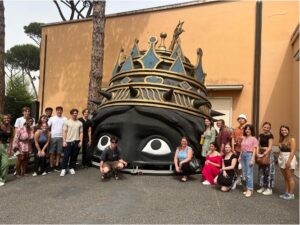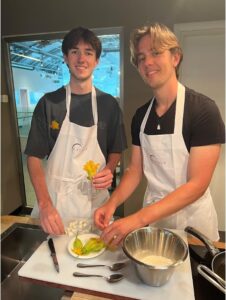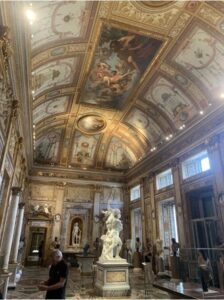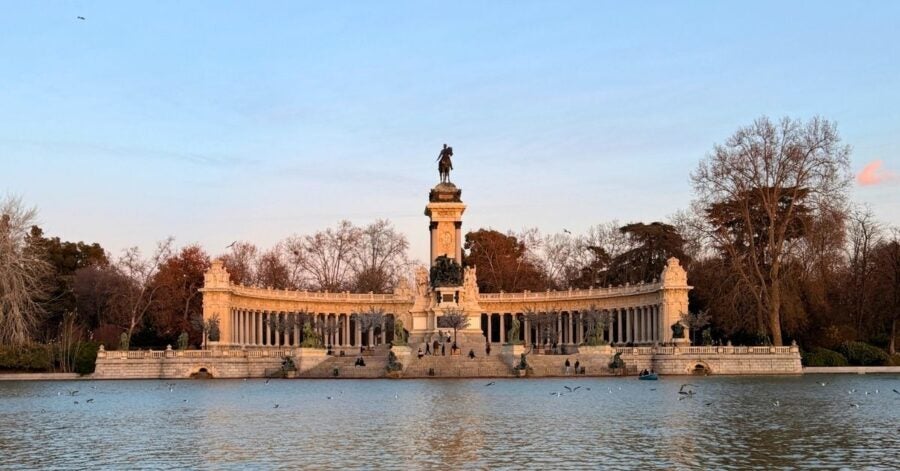
As someone who studies Ancient Rome, Latin and Italian, there’s nowhere more fitting for me to live than in Rome. It feels nearly impossible to write a blog post about it because there are many different aspects of Roman and Italian culture to focus on.
I could paint you a culinary picture of gelato and tiramisu worthy of Michelangelo himself. I could write a thesis on the cultural importance of the four pastas of Rome and which is the best (it’s amatriciana, in my opinion). I’ve spent hours pouring over texts and articles that detail the lives and times of Ancient Rome, but nothing could have prepared me for the marvelous architecture I would see.
The mix of Latin and Italian languages is a magnificent fusion of past and present. I find the influence that Romans bring to their language absolutely fascinating. Whether religious or mythical, Renaissance or modern, sculpture or painting, Rome serves it up on a spectacular platter like it’s no big thing at all.

Language
I was slightly nervous about participating in this program. Spending six weeks with a host family trying to only speak Italian with them sounded incredibly exciting, but also stressful. I was worried that it wouldn’t work; I was worried that I would get to the end and not know any more Italian than when I started.
Thankfully for me (and also for you if you are interested in learning a language abroad) that has definitely not been the case. No matter how much grammar you study or how many times you go to office hours, you can’t come to understand the real way language interacts with its culture — dialect, common phrases, accent — until you step into it.
Living with a host family has been an especially valuable experience. Not only has my Italian language level increased much faster than I thought, but through my host family, I’ve been able to learn about and experience true Roman life. I’ve gone on trips, met their friends, cooked traditional dishes and played local card games. Without my host family, this program wouldn’t be half of what it is.
One final thing I will add about Italians is that they love when people put in the effort to speak their language. The amount of compliments I’ve gotten from random Italian “nonnas,” or waiters about my (quite mediocre) Italian has not only made me feel good but has also improved my speaking confidence to no end.

History
The other astounding thing about Rome has to be its ancient history. Last weekend I went to San Clemente, a small basilica near — and thus quite overshadowed by — the Colosseum. On the surface, it is an ordinary church, beautifully ornate and well worth a visit, yet sparsely populated due to the sheer number of similar churches that dot the landscape of Rome.
However, if you descend a few flights of stairs, you can find a near-perfectly preserved basilica built in the fourth century directly below it. Below that, a first-century Roman house that was converted into a temple for the Cult of Mithras. To those lucky enough to stumble across it (I only did at the insistence of my host parents) this stratified building acts as a three-tiered cake of history and I have never before so plainly understood the passage of time and the course of history as I do now.
Aside from an off-the-beaten-path recommendation, I want this snapshot into my life to show how history and modernity can work in tandem. Rome is perhaps the best city in the Western world for this sort of thing. It is home to one of the grandest empires of all time and the seat of the Catholic church, for practically all of Europe’s life, Rome has been at the forefront. It shows, too that you can’t walk a block in the city without seeing uncovered ruins. Not to mention, churches are a dime a dozen here.
Rome obviously has its problems with its history and how it preserves it — Mussolini leveled an entire Roman forum to build a road where he could hold military parades — but even that is now a part of the history on display in the city. In the end, it makes for an incredibly breathtaking and informative setting to live in.
Over my six weeks in Rome, I have learned how much this storied city truly offers. There is something here for everyone and Rome excels in every artistic, historical or cultural sense you could imagine. Just please, if you come here, be prepared: the buses in the eternal city are eternally late.
This post was contributed by Nathaniel Heffron, a Global Ambassador for Summer 2024. Nathaniel is a sophomore classical languages and classical studies major studying abroad in Rome, Italy.





